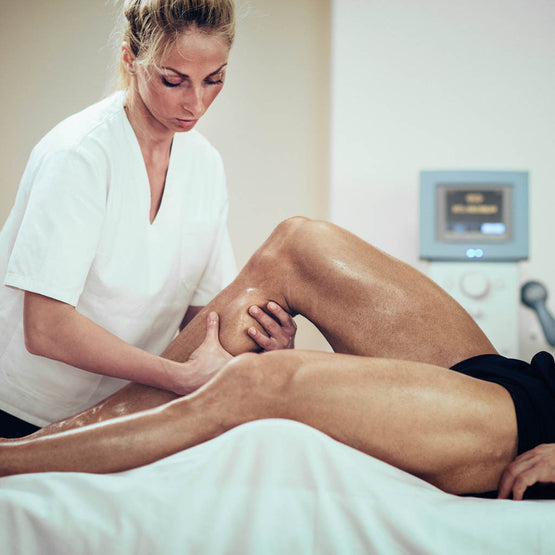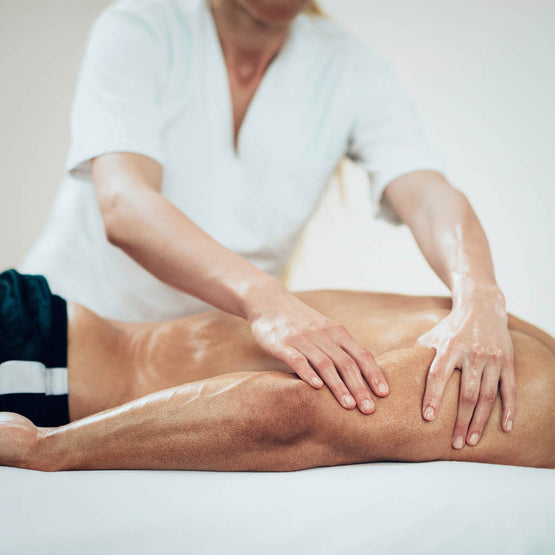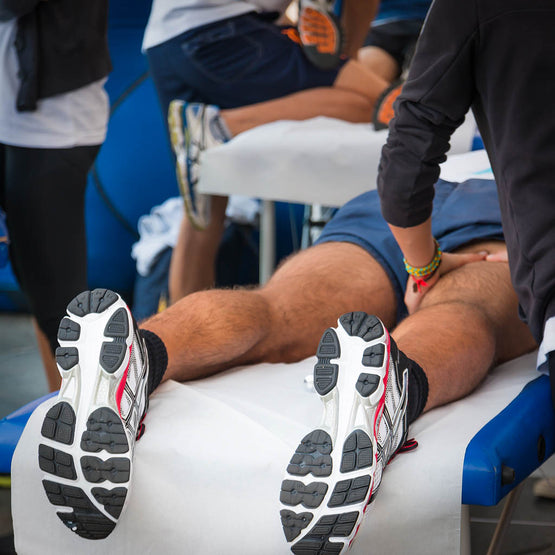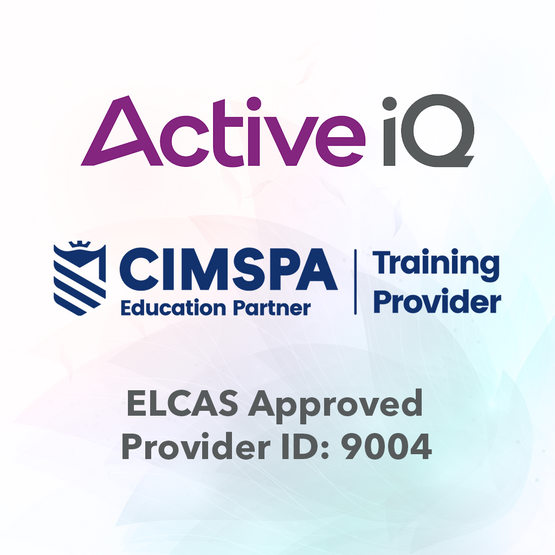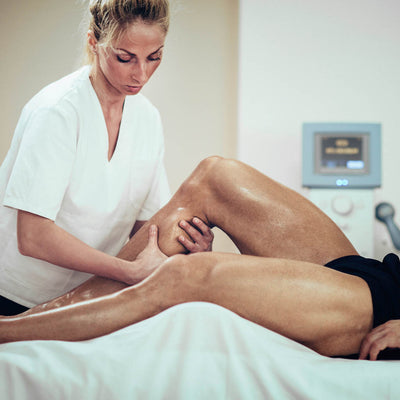Level 3 & Level 4 Diploma in Sports Massage Therapy (Package)
If you want to pay a smaller amount over a longer period, you can do so at checkout.
SAVE £550 BOOKING THIS PACKAGE AND GET A FREE STARTER PACK WORTH £395 -see details below
Whether you're new to the fitness industry or already a fitness professional and want the full qualification and knowledge to be able to start your business as a Sports Massage Therapist, we'll give you the skills and experience for you to give your clients who have dysfunctional tissue, without acute/post-acute injuries or underlying pathological conditions therapy.
CURRENT OFFER: Get a free Starter Pack when you book on the Online/ Blended Learning Level 3 & Level 4 package.
The Starter pack contains a portable massage bed, towels and massage oils & cream worth £395. Everything you need to study and practice from home. (ELCAS credits not eligible)
Course Start Date:
Online- Level 3 Online/blended & Level 4 Online or blended option
Level 3 Online: Start on demand
Level 4 Online: Start on demand after completing L3
Intensive Course -2 x 3 weeks M-F Level 3 & Level 4
Level 3: May 2025. Venue -www.movestrong-gym.co.uk Newcastle Upon Tyne Level 4: June 2025. Venue -www.movestrong-gym.co.uk Newcastle Upon Tyne
When you book the Level 3 & Level 4 together, we offer it at a discounted rate saving up to £550. You have up to 1 year to complete your Level 4 after starting your Level 3, so if you need a break in between, you can take it!
Get 15% Off all non-promotional Sports Massage Therapy and Sports Healthcare products with our Partner Physique. Discount automatically applied, click on the banner to see your savings!
- Course Content - Level 3
- Course Content - Level 4
- Assessment
- Study Format
- Certification
- Entry Requirements
- ELCAS Funding - our number 9004
- Course Reviews
The aim of this qualification is to provide learners with the knowledge and skills to be able to provide sports massage therapy to a range of clients who have dysfunctional tissue, without acute/post-acute injuries or underlying pathological conditions.
- Anatomy and physiology for sports massage
- Clinical issues – safe treatment, sports massage regulation, professionalism and ethics, continuing professional development and communication skills
- Sports massage techniques including palpation, basic strokes, neuromuscular and muscle energy techniques and soft tissue release
- Assessment of clients, joint and muscle testing, assessment of posture, profiling and appropriate record-keeping
- Soft tissue damage and repair – injury occurrence and treatment
- Post-care advice – supporting clients’ return to function
The course will provide learners with the knowledge and skills required to be able to treat, and/or seek the correct common patterns of dysfunction and pre-diagnose injuries. The course will also equip learners with advanced palpation skills and those needed to analyse posture and range of movement.
The course is inclusive of a range of advanced neuromuscular and myofascial techniques optimising treatment outcomes as well as how to plan and program a client’s post-care treatment will be undertaken. In particular, students will focus on advanced neuromuscular techniques, myofascial release and the appropriate use of the ARTS and SOAP protocols.
The majority of massage therapists are self-employed and work as personal trainers or in the private sector of healthcare. Therapists are able to safely and effectively treat clients from all walks of life, suffering a variety of musculoskeletal as well as medical conditions. This offers the therapist the greatest potential for success in a career that can be immensely satisfying and enjoyable. By enhancing their skills, learners completing the certificate will be able to achieve more in the treatments applied, clearly differentiate themselves from other practitioners and drive their business practice to new heights.
Students will study three distinct units:
- Conducting a subjective and objective assessment
- Treatment modalities to support soft tissue repair
- Provide sports massage techniques to prevent and manage injury
Unit Components Include
- Management of injuries
- Soft tissue mobilisation
- Postural analysis
- Range of movement tests
- Active, passive and resistive stretches
- Stretching and rehabilitative exercises
- Advanced massage techniques
- Frictions
- Soft tissue release
- METS
- Trigger points
- The Science and Practice of Manual Therapy
- Advanced Functional Anatomy & Physiology
- Assessment of Posture, Joints, Muscle Imbalances and other Conditions
- Soft Tissue Trauma, Assessment and how Massage may Help
- Principles of Injury Management and Rehabilitation from Injury
- Active, Assisted and Advanced Stretching Techniques
- Assessment of Soft Tissues and application of Advanced Techniques
- Working Practice and Developing Your Business
- Psychology and Sports Injuries
- Legal and Ethical Aspects of Professional Practice
- In-depth assessment methods and techniques
- Identifying injury and dysfunction
- Advanced massage techniques including frictions, trigger point therapy, soft tissue therapy etc.
- Devising treatment plans and post-care
Assessments - Level 3
- Monitoring of progress informally through observation, quizzes, and professional discussion
- Active IQ multiple choice theory paper (Anatomy & Physiology)
- Anatomy and physiology & soft tissue damage and repair revision questions
- Massage practical assessment x 3 (pre, post, maintenance massage), in line with current criteria; students required to integrate effleurage, petrissage, frictions, soft tissue release in a safe and effective treatment
- 1 to 1 practical and group/ partner work in line with the current criteria. Students will be assessed on communication, subjective and objective assessment through history taking, notation, observation, active, passive and resisted range of motion tests before moving on to palpation and treatment protocols
- 40+ hours cumulative treatment record, including thorough notes on assessments, treatments and exercise advice. Self-evaluations and client evaluation. There should be a variety of clients used. Utilising a cross-section of population age, sporting & activity levels and backgrounds
- Peer presentations may be used throughout the course noting key points on assessment used alteration in treatments and exercises.
Assessments - Level 4
- Ongoing practical assessments and oral questioning (Two worksheets & Summative observation – Palpation)
- Five summative observations – Client assessment and treatment planning (ankle or knee, hip, spine, shoulder, elbow or wrist)
- Critical evaluation
- A completed assessment portfolio which details sports massage treatments on five clients with evidence of consultations and assessments
- Multiple Choice Examination.
We have two options:
Intensive Course - Level 3 & Level 4
The course will start with 4-weeks of pre-course reading before you start the course. Then you'll complete a 6-week intensive classroom-based course ( 4 weeks break in between L3 & L4 ) Monday - Friday 09:30 - 16:30.

Online - Level 3 Online & Level 4 Online or Blended option
Level 3 Online: Study at your own pace, at home with e-learning and resources, ongoing tutor support and submission of live video assessments.
Level 4 Online: Study at your own pace, at home with e-learning and resources, ongoing tutor support and submission of live video assessments. Blended option with 30% face to face practical's and assessments at our Newcastle Academy.


- Active IQ Level 3 Diploma in Sports Massage Therapy
- Active IQ Level 4 Certificate in Sports Massage Therapy
- CIMSPA Training Provider Partner
There are no specific entry requirements.
Are you leaving the forces and looking to retrain as a therapist ? You can use the Enhanced Learning Credits to fund our Level 3 and 4 courses.
Contact us for more information.
Amazing!!!
